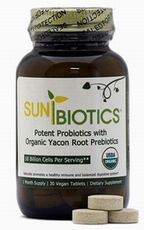
Look for yourself at the probiotics available today, and you'll find something curious: Virtually none of them are certified USDA organic. Why is that? If you read the ingredients on the label, you might scratch your head and wonder why they can't make those ingredients organic. But the real story is found in the "dirty little secret" that probiotics supplement manufacturers are not listing on the labels: Maltodextrin and other fillers and flow agents that are derived from GM corn.
You are being lied to about probiotics ingredients
Here's the rock-bottom truth about probiotics: You are being LIED to about what they're made from because the FDA does not require manufacturers to list fillers and flow agents as ingredients.
Yep, you read that right: A probiotics manufacturer can add genetically modified corn maltodextrin to their formula and they are not required to disclose this on the label. While the maltodextrin will disqualify them from receiving organic certification, it doesn't stop them from using the word "natural" on their bottles.
Our Natural News investigation found that some probiotics contain as much as 30% maltodextrin in their formulas. Virtually all maltodextrin available today comes from genetically modified corn.
This means that consumers who think they're buying a healthy product to support digestion are actually buying products made from corn plants that are engineered to grow insecticide toxins right inside each and every kernel. Processing this into refined maltodextrin does not necessarily remove this toxin, meaning maltodextrin itself may be contaminated with the bt toxin that functions as an insecticide.
Check your probiotics label right now
If you take probiotics, check your label right now: Is it certified organic?
If not, it may contain maltodextrin derived from genetically modified corn, even if maltodextrin is not listed on the label!
You might be eating genetically modified corn byproducts and not even know it. Check with the manufacturer of your supplement and find out if they use maltodextrin or other corn-derived flow agents.
For the record, not all probiotics we investigated were made using maltodextrin, but the vast majority were. I'm not naming brands here because I don't care to be sued by a dozen manufacturers for blowing the whistle on their product formulation schemes that expose their customers to GMOs. But it's easy to see this for yourself: If it's not certified organic, it likely contains genetically modified ingredients.
How to really avoid GMOs in probiotics
The answer is simple: Buy certified USDA organic probiotics.
GMO-derived ingredients and flow agents like maltodextrin are NOT allowed to be used in certified organic formulations. And the USDA organic program is very stringent. I know this because I personally oversee production of certified organic products, and it's very detailed and very strict. Every batch of raw ingredients must be meticulously tracked, and manufacturers are audited once a year, on site, by USDA-approved inspectors who go through all your books and records to verify you're not cutting corners.
If you try to locate certified organic probiotics, you'll find there are virtually none in the marketplace. This should be your first clue that something's up. Red flag time. Why are there virtually no certified organic probiotics available today? Because the vast majority of probiotics supplements use genetically modified corn maltodextrin! Therefore, they are disqualified from USDA organic certification.
I take probiotics, and in my own search for certified USDA organic probiotics, I finally found the Sunbiotics brand. This, my friends, is the solution we've all been looking for.
Sunbiotics certified USDA organic chewable probiotics
This is the absolute best probiotic supplement available anywhere in the world today. Nothing compares to it, in my view, and I've been investigating the nutritional supplements industry for over a decade.
The Sunbiotics certified USDA organic chewable probiotics tablets are made with friendly bacteria strains carried on organic yacon root powder. (Yacon is a superfood from Peru.) The other ingredients are organic coconut sugar (delicious and low glycemic), organic vanilla flavor and silica. The silica is plant-derived. It's the same silica you get from the horsetail herb (a plant, not a horse's tail, obviously).
Each tablet delivers 18 billion CFUs of four probiotic strains:
• Lactobacillus acidophilus
• Bifidobacterium bifidum
• Bifidobacterium lactis
• Bifidobacterium longum
These Sunbiotics chewable tablets taste like yacon root candy! They're really delicious. Plus, there's no refrigeration required.
No soy, no dairy, no GMO, no wheat, no refined sugars, no corn, no nonsense!
What's especially remarkable about these Sunbiotics chewable supplements is what they do NOT contain. This is the whole point, of course: They do NOT contain soy, corn, wheat, refined sugars and so on.
No hidden ingredients whatsoever. No secret GMO maltodextrin like we found in other brands.
If you're looking for a trusted source of USDA organic probiotics that are delicious and chewable -- and even made with a superfood! -- look no further. This is it. This is now my top recommended source for probiotics, and it's what I'm taking.
The only problem with these is that they taste so good you actually want to eat them more than once a day.





